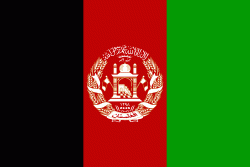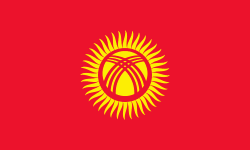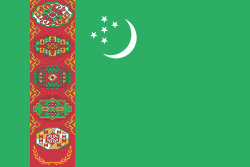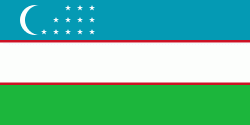Uzbek language
Uzbek (Latin script: Oʻzbekcha, Oʻzbek tili; Cyrillic script: Ўзбекча, Ўзбек тили; Perso-Arabic script: اۉزبېکچە, اۉزبېک تیلی), formerly known as Turki or Western Turki, is a Turkic language spoken by Uzbeks. It is the official, and national language of Uzbekistan. Uzbek is spoken as either native or second language by 44 million people around the world (L1+L2), making it the second-most widely spoken Turkic language after Turkish. There are two major variants of Uzbek language, Northern Uzbek spoken in Uzbekistan, Kyrgyzstan, Kazakhstan, Tajikistan, Turkmenistan and China and Southern Uzbek spoken in Afghanistan and Pakistan.
Uzbek belongs to the Eastern Turkic or Karluk branch of the Turkic language family. External influences include Arabic, Persian and Russian. One of the most noticeable distinctions of Uzbek from other Turkic languages is the rounding of the vowel to, a feature that was influenced by Persian. Unlike other Turkic languages, vowel harmony is nigh-completely lost in modern Standard Uzbek, though it is (albeit somewhat less strictly) still observed in its dialects, as well as its sister Karluk language Uyghur.
In February 2021, the Uzbek government announced that Uzbekistan plans to fully transition the Uzbek language from the Cyrillic script to a Latin-based alphabet by 1 January 2023. Similar deadlines had been extended several times.
Uzbek is a member of the Karluk languages, a sub-group of Turkic languages, belonging to the western branch, while the eastern variety carrying the name Uyghur. Since the family is classified to be a dialect continuum, it can be noted that it is found to be the most suitable variety or dialect to be understood by the most number of various Turkic language speakers, despite it being heavily Persianized, excluding the Siberian Turkic languages.
A high degree of mutual intelligibility found between certain specific Turkic languages, geographically located close or sometimes further from the area where Uzbek is spoken, has allowed the speakers of Uzbek to (with ease) comprehend various other distantly related languages.
Uzbek belongs to the Eastern Turkic or Karluk branch of the Turkic language family. External influences include Arabic, Persian and Russian. One of the most noticeable distinctions of Uzbek from other Turkic languages is the rounding of the vowel to, a feature that was influenced by Persian. Unlike other Turkic languages, vowel harmony is nigh-completely lost in modern Standard Uzbek, though it is (albeit somewhat less strictly) still observed in its dialects, as well as its sister Karluk language Uyghur.
In February 2021, the Uzbek government announced that Uzbekistan plans to fully transition the Uzbek language from the Cyrillic script to a Latin-based alphabet by 1 January 2023. Similar deadlines had been extended several times.
Uzbek is a member of the Karluk languages, a sub-group of Turkic languages, belonging to the western branch, while the eastern variety carrying the name Uyghur. Since the family is classified to be a dialect continuum, it can be noted that it is found to be the most suitable variety or dialect to be understood by the most number of various Turkic language speakers, despite it being heavily Persianized, excluding the Siberian Turkic languages.
A high degree of mutual intelligibility found between certain specific Turkic languages, geographically located close or sometimes further from the area where Uzbek is spoken, has allowed the speakers of Uzbek to (with ease) comprehend various other distantly related languages.
Country
-
Afghanistan
Afghanistan, officially the Islamic Emirate of Afghanistan, is a landlocked country located at the crossroads of Central Asia and South Asia. Referred to as the Heart of Asia, it is bordered by Pakistan to the east and south, Iran to the west, Turkmenistan to the northwest, Uzbekistan to the north, Tajikistan to the northeast, and China to the northeast and east. Occupying 652864 km2 of land, the country is predominantly mountainous with plains in the north and the southwest, which are separated by the Hindu Kush mountain range. Kabul is the country's largest city and serves as its capital. , Afghanistan's population is 40.2 million (officially estimated to be 32.9 million ), composed of ethnic Pashtuns, Tajiks, Hazaras, Uzbeks, Turkmens, Qizilbash, Aimak, Pashayi, Baloch, Pamiris, Nuristanis, and others.
Human habitation in Afghanistan dates back to the Middle Paleolithic era, and the country's strategic location along the historic Silk Road has led it to being described, picturesquely, as the ‘roundabout of the ancient world’. Popularly referred to as the graveyard of empires, the land has historically been home to various peoples and has witnessed numerous military campaigns, including those by the Persians, Alexander the Great, the Maurya Empire, Arab Muslims, the Mongols, the British, the Soviet Union, and most recently by a US-led coalition. Afghanistan also served as the source from which the Greco-Bactrians and the Mughals, amongst others, rose to form major empires. The various conquests and periods in both the Iranian and Indian cultural spheres made the area a center for Zoroastrianism, Buddhism, Hinduism, and later Islam throughout history. -
Kyrgyzstan
Kyrgyzstan or the Kyrgyz Republic is a landlocked country in Central Asia. Kyrgyzstan is bordered by Kazakhstan to the north, Uzbekistan to the west, Tajikistan to the south, and the People's Republic of China to the east. Its capital and largest city is Bishkek.
Ethnic Kyrgyz make up the majority of the country's 6.6 million people, followed by significant minorities of Uzbeks and Russians. The Kyrgyz language is closely related to other Turkic languages. -
Turkmenistan
Turkmenistan ( or ; Türkmenistan / Түркменистан, ) is a country located in Central Asia, bordered by Kazakhstan to the northwest, Uzbekistan to the north, east and northeast, Afghanistan to the southeast, Iran to the south and southwest and the Caspian Sea to the west. Ashgabat is the capital and largest city. The population is about 6 million, the lowest of the Central Asian republics, and Turkmenistan is one of the most sparsely populated nations in Asia.
Turkmenistan has long served as a thoroughfare for other nations and cultures. Merv is one of the oldest oasis-cities in Central Asia, and was once the biggest city in the world. It was also one of the great cities of the Islamic world and an important stop on the Silk Road. Annexed by the Russian Empire in 1881, Turkmenistan figured prominently in the anti-Bolshevik movement in Central Asia. In 1925, Turkmenistan became a constituent republic of the Soviet Union, the Turkmen Soviet Socialist Republic (Turkmen SSR); it became independent after the dissolution of the Soviet Union in 1991. -
Uzbekistan
Uzbekistan (, ; Ozbekiston / Ўзбекистон, ; Узбекистан), officially the Republic of Uzbekistan (Ozbekiston Respublikasi / Ўзбекистон Республикаси; Республика Узбекистан), is a doubly landlocked country located in Central Asia. It is surrounded by five landlocked countries: Kazakhstan to the north; Kyrgyzstan to the northeast; Tajikistan to the southeast; Afghanistan to the south; and Turkmenistan to the southwest. Its capital and largest city is Tashkent. Uzbekistan is part of the Turkic world, as well as a member of the Organization of Turkic States. The Uzbek language is the majority-spoken language in Uzbekistan, while Russian is widely spoken and understood throughout the country. Tajik is also spoken as a minority language, predominantly in Samarkand and Bukhara. Islam is the predominant religion in Uzbekistan, most Uzbeks being Sunni Muslims.
The first recorded settlers in what is now Uzbekistan were Eastern Iranian nomads, known as Scythians, who founded kingdoms in Khwarazm (8th–6th centuries BC), Bactria (8th–6th centuries BC), Sogdia (8th–6th centuries BC), Fergana (3rd century BC – sixth century AD), and Margiana (3rd century BC – sixth century AD). The area was incorporated into the Iranian Achaemenid Empire and, after a period of Macedonian rule, was ruled by the Iranian Parthian Empire and later by the Sasanian Empire, until the Muslim conquest of Persia in the seventh century.
